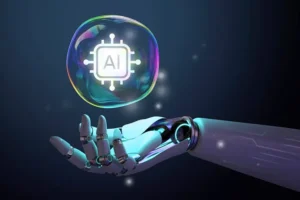
Artificial Intelligence (AI) is not just a buzzword in today’s workforce — it’s transforming industries and reshaping the job market in ways that were once unimaginable. From automation taking over repetitive tasks to the rise of entirely new career paths, AI is having a profound impact on how we work, what jobs exist, and how we future-proof our careers. In this article, we’ll explore how AI is changing the job market and how workers can adapt to this new landscape.
1. Automation and the Shifting Nature of Jobs
The most noticeable effect of AI in the workplace is automation. AI-driven systems can now handle repetitive, time-consuming tasks across various sectors, from customer service to manufacturing. With AI tools capable of processing vast amounts of data, businesses are finding efficiencies in operations, reducing costs, and freeing up human workers for more complex, value-added activities.
Impact on Low-Skill Jobs
For jobs that rely heavily on routine tasks, such as data entry, assembly line work, or basic customer support, AI is replacing human workers. While this can lead to job displacement, it also opens opportunities for workers to shift into higher-skill roles that require more human intelligence, emotional judgment, and creative thinking — qualities that AI cannot replicate.
2. New Career Paths Powered by AI
While AI may be automating certain tasks, it is also creating a wealth of new job opportunities. The demand for professionals who can build, maintain, and optimize AI systems is on the rise. These roles span multiple industries, from tech to healthcare, finance, and even education.
AI-Specific Roles
Some emerging job titles include:
- AI Specialist: Experts who design, implement, and troubleshoot AI solutions.
- Data Scientist/Engineer: Professionals who analyze data and work with AI algorithms to derive insights.
- AI Ethicist: As AI becomes more pervasive, organizations will need experts to ensure ethical standards are maintained, especially concerning privacy, bias, and decision-making.
- AI Trainer: These individuals are responsible for training AI models, often requiring domain-specific knowledge and deep learning expertise.
Industry-Specific Opportunities
Beyond tech, AI is also affecting industries like healthcare, where AI-powered diagnostic tools are improving patient outcomes, or finance, where AI-driven analytics are optimizing investment strategies. These fields are actively hiring new types of professionals, from AI consultants to technical project managers.
3. The Rise of Hybrid Roles
As businesses adopt AI, there’s a growing demand for hybrid roles that blend technical expertise with domain knowledge. Workers with skills in both AI and their specific industry are highly sought after.
For example:
- Marketing professionals with knowledge of AI can use predictive analytics and customer segmentation algorithms to create more personalized campaigns.
- Healthcare workers who understand AI-assisted diagnostics can work alongside technology to offer better patient care.
- HR professionals who can leverage AI for talent sourcing and employee performance analysis are in high demand.
These hybrid roles are transforming the traditional boundaries of industries, offering new ways to drive innovation and create value.
4. Future-Proofing Your Skills
In a world where AI is rapidly changing job landscapes, future-proofing your career is more important than ever. Here are some steps to stay competitive:
1. Embrace Lifelong Learning
AI and technology are evolving at a fast pace, which means it’s crucial to continually update your skills. Consider enrolling in online courses or certifications related to AI, data science, machine learning, or other tech-related fields. Platforms like Coursera, Udacity, and edX offer accessible learning opportunities that can keep you ahead of the curve.
2. Focus on Soft Skills
While AI can automate tasks, it still lacks emotional intelligence, creativity, and the ability to navigate complex social dynamics. Focusing on developing your soft skills — such as critical thinking, problem-solving, emotional intelligence, and leadership — will make you invaluable in roles that require human interaction, strategic decision-making, and innovation.
3. Be Tech-Savvy
Regardless of your industry, understanding how AI tools can be integrated into your workflow is becoming increasingly important. Even if you’re not in a technical role, familiarity with AI concepts like machine learning, natural language processing, or automation can give you a competitive edge.
4. Seek Out AI-Related Projects
Incorporating AI projects into your current role or seeking opportunities that involve AI will demonstrate your adaptability and forward-thinking approach. This hands-on experience will make you a more attractive candidate for future roles that require AI literacy.
5. Preparing for the Future: The Role of Governments and Organizations
As AI continues to evolve, it’s crucial that governments, businesses, and educational institutions work together to address the challenges of the job market transformation.
Government Initiatives
Governments are playing an important role in mitigating the disruption caused by AI. This includes funding for reskilling programs, incentivizing AI research, and ensuring that social safety nets (like unemployment benefits) are available for those displaced by automation.
Corporate Responsibility
Companies need to invest in their workforce’s development by offering reskilling opportunities. For businesses adopting AI, offering training programs to help employees transition into new roles will be essential to ensure a smooth shift to an AI-powered future.
Conclusion: A Positive Transformation for the Workforce
While the advent of AI brings both challenges and opportunities, it ultimately offers a chance for innovation and growth across industries. While certain jobs may be displaced, the demand for new skills and careers is on the rise. By embracing AI tools, continuously upskilling, and developing hybrid skills, workers can navigate this transformative landscape and thrive in an AI-enhanced future.






